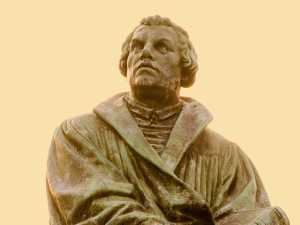by Rev. Jason Lane
 Among his many contributions to the church, Luther also transformed and ennobled the German language through his translation of the Bible. In an open letter On Translating (1530), Luther was well aware of his contribution to the language and to the theological discourse of his day. He even taught his opponents to speak German:
Among his many contributions to the church, Luther also transformed and ennobled the German language through his translation of the Bible. In an open letter On Translating (1530), Luther was well aware of his contribution to the language and to the theological discourse of his day. He even taught his opponents to speak German:
“First if I, Dr. Luther, could have expected that all the papists taken together would be capable enough to translate a single chapter of the Scriptures correctly and well, I should certainly have mustered up enough humility to invite their aid and assistance in putting the New Testament into German. But because I knew—and still see with my own eyes—that none of them knows how to translate, or to speak German, I spared them and myself that trouble. It is evident, indeed, that from my German translation they are learning to speak and write German, and so are stealing from me my language, of which they had little knowledge before. …[I]t tickles me that I have taught my ungrateful pupils, even my enemies, how to speak.” (LW 35:182-183)
It’s worth remembering that for over 400 years, Germans—including the Saxon immigrants of the LCMS—learned how to read and write German from Luther’s Bible. It is the masterpiece of German literature. But what does that have to do with us anglophones in North America? More than we may think.
Other translations of Scripture besides the Latin Vulgate were available, but Luther’s Bible was arguably the best. His opponents however, prophesied that a vernacular translation of Scripture, which allowed anyone to read and interpret the Bible for him or herself, would mean the end of Christian unity: the church would split and there would be as many interpretations of Scripture as there are interpreters. In the wake of the Enlightenment and Romanticism, the ascent of human reason and emotion, Luther’s opponents were eerily accurate. Protestantism, as well as Lutheranism, is clearly fractured. Instead of the pope or the church councils lording over the Scriptures, now our own fancy has taken their place. Has access to the Scriptures really set us free? Or have we fled from one tyrant to another? Has the tyranny of the pope been replaced by the tyranny of our own reason, will, and emotion?
That is the risk Luther took when he set out to translate the Bible. In order to loosen the chains of papal captivity, Luther placed the Scriptures in our laps. We could abuse and misuse them and many have. Like Christ, the Scriptures are meek and lowly of heart. God’s Word is placed into the hands of sinners who do not by nature want to submit their reason, will, or passions to the wisdom of God. Yet “the Word of the Lord will stand forever” (Isa. 40:8). Luther’s confidence was not in the wisdom of the interpreters, but in the unchanging Word of God. Rome believed that the Scriptures were too difficult for common people to understand. Luther believed that God’s Word is clear and should be published for all to read. It wasn’t any riskier than God sending His Son into the world. No matter how dark the world or our hearts are, “the Light shines in the darkness, and the darkness has not overcome it (John 1:5), nor could it.
As Luther knew, the Word of God shines brightly. It does not require our insights to give it brightness. Neither our interpretation nor the Roman Catholic Church’s interpretation of the Bible illuminates God’s Word. It is already bright. Scripture interprets Scripture. And Luther’s faith was grounded in the biblical text that interprets itself.
In translating, he maintained that the translation must speak as clearly as the original text, because the text shines brightly to illuminate the hearts of sinful men. Therefore, God the Holy Spirit must speak German. If we are to follow Luther, pastors who do their work of translating for Bible classes and sermons should also try with all their mind and might to make the Holy Spirit speak English. It requires study and diligence, but it is our calling from God.
Luther was, before all else, a preacher. He worked tirelessly to communicate the word of God that kills and makes alive. His groundbreaking translation of the Holy Scriptures into German vernacular, and his tireless revision until his death in 1546, teach us that translating is not a skill, but an art, vital to preaching and communicating God’s Word. May this celebration of the Reformation, engender in us a new love of reading, marking, inwardly digesting, and translating freshly God’s Word for the sake of His people. God grant it again. Amen.
Rev. Jason D. Lane is Assistant Professor of Theology at Concordia University Wisconsin in Mequon, WI.

